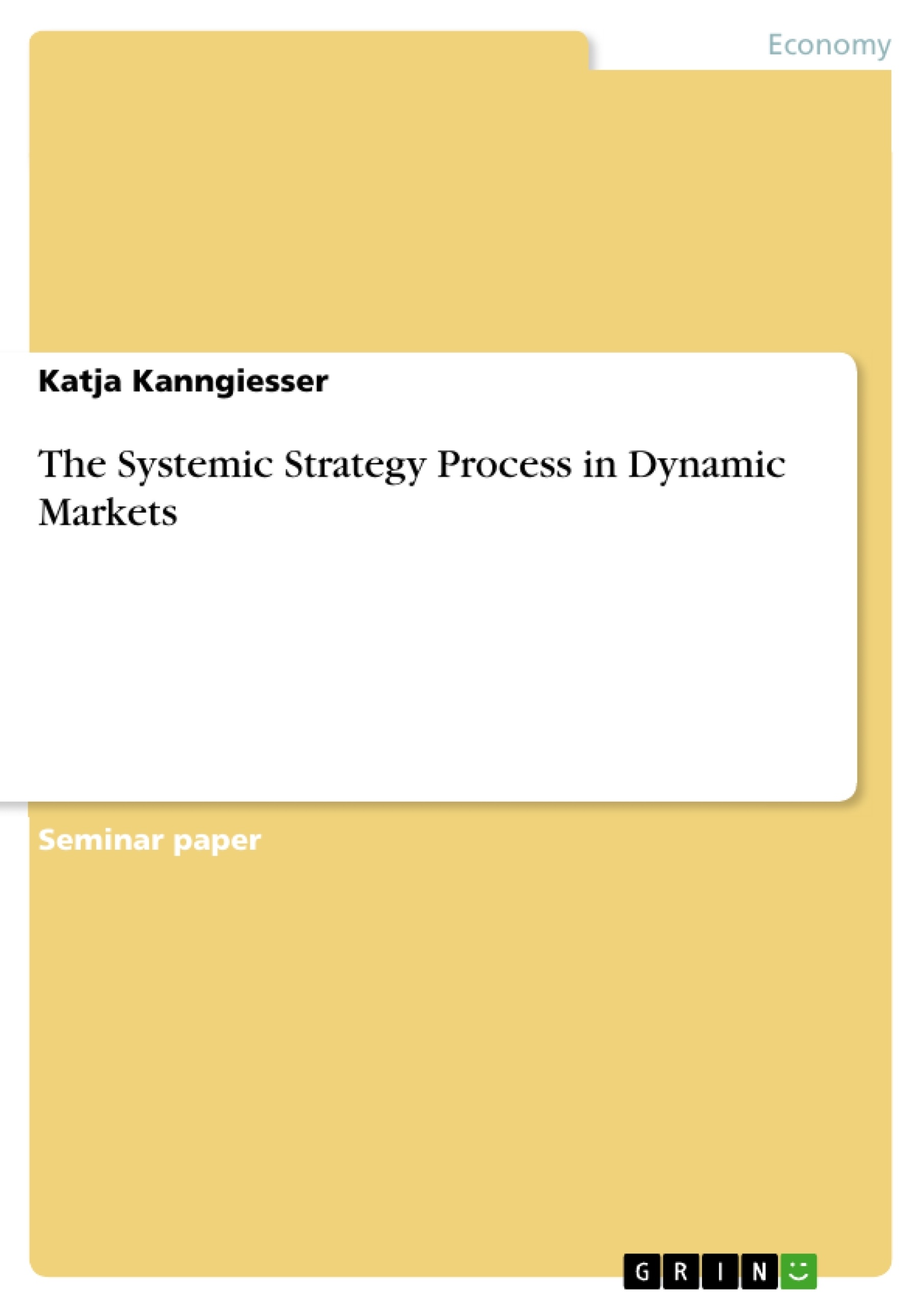This paper is composed of six chapters. Subsequent to this introduction the second chapter will present the traditional strategy process with its underlying strategic paradigms and illustrate the deficiencies this process shows in dynamic markets. Considering these deficiencies the strategic paradigm of the complexity theory of strategy will be introduced in the third chapter. This new paradigm provides the theoretical underpinning for a systemic strategy process, whose general characteristics will be described in the second part of the third chapter. The fourth chapter is devoted to the course of the systemic strategy process with its particular stages - namely business ecosystem inter-pretation, business model review, strategy options review, strategy implementation, and strategy performance measurement. In the following chapter differences of the new sys-temic strategy process compared to the traditional strategy process will be pointed out to show whether it is apt to compensate the deficiencies of the traditional strategy process in dynamic markets. The closing chapter presents a summary of the key findings of the paper and the corresponding implications for researchers and managers.
Inhaltsverzeichnis (Table of Contents)
- Introduction
- Background and objectives
- Outline and structure of the paper
- The traditional strategy process
- Paradigms of the traditional strategy process
- Deficiencies of the traditional strategy process
- The systemic strategy process
- The systemic strategy paradigm: complexity theory of strategy
- General characteristics of the systemic strategy process
- Stages of a systemic strategy process
- Business ecosystem interpretation
- Business model review
- Strategy options review
- Strategy implementation
- Strategy performance measurement
- Evaluation of the systemic strategy process
- Conclusion and implications for research and management
Zielsetzung und Themenschwerpunkte (Objectives and Key Themes)
The primary goal of this paper is to analyze the systemic strategy process and its potential to address the challenges posed by today's dynamic markets. The paper seeks to explain how systemic elements can be combined to create a new strategy process that is more adaptable and responsive than the traditional approach.
- The shift from traditional to systemic strategic thinking in response to changing market dynamics
- The complexity theory of strategy and its integration of dynamic capabilities, systemic thinking, and Austrian economics
- The limitations of the traditional strategy process in dynamic environments
- The key features and stages of the systemic strategy process
- The implications of the systemic strategy process for research and management practices
Zusammenfassung der Kapitel (Chapter Summaries)
- Introduction: This chapter introduces the paper's objectives and outlines the structure of the subsequent chapters. It emphasizes the complexity of today's business environment and the need for a new strategic approach.
- The traditional strategy process: This chapter analyzes the traditional strategy process and its underlying paradigms, identifying the deficiencies it exhibits in dynamic markets. It highlights the challenges of relying on past experiences and predetermined plans in a constantly evolving environment.
- The systemic strategy process: This chapter introduces the systemic strategy paradigm, which combines dynamic capabilities, systemic thinking, and Austrian economics. It explores the key elements of this new approach and discusses its potential benefits for strategic decision-making.
- Stages of a systemic strategy process: This chapter delves into the specific stages involved in the implementation of a systemic strategy process. It outlines the steps required to interpret business ecosystems, review business models, explore strategy options, implement chosen strategies, and measure their performance.
Schlüsselwörter (Keywords)
The key terms and concepts explored in this paper include: systemic strategy, complexity theory of strategy, dynamic capabilities, systemic thinking, Austrian economics, traditional strategy process, dynamic markets, business ecosystem, business model, strategy implementation, strategy performance measurement.
Frequently Asked Questions
What is the main objective of the paper on systemic strategy?
The paper aims to analyze the systemic strategy process and its effectiveness in addressing the challenges of dynamic markets compared to traditional methods.
What are the deficiencies of the traditional strategy process?
Traditional strategy processes often fail in dynamic markets because they rely on past experiences and predetermined plans that cannot adapt to rapid environmental changes.
What theoretical framework supports the systemic strategy process?
The systemic strategy process is underpinned by the complexity theory of strategy, which integrates dynamic capabilities, systemic thinking, and principles of Austrian economics.
What are the key stages of a systemic strategy process?
The process includes five main stages: business ecosystem interpretation, business model review, strategy options review, strategy implementation, and strategy performance measurement.
How does systemic strategy differ from traditional strategy in dynamic markets?
Systemic strategy is designed to be more adaptable and responsive, compensating for the rigidities of traditional paradigms by focusing on continuous interpretation and systemic interaction.
What are the implications for managers according to this study?
Managers are encouraged to shift from linear planning to a more systemic approach that accounts for complexity and emphasizes dynamic capabilities within their organizations.
- Citation du texte
- Katja Kanngiesser (Auteur), 2005, The Systemic Strategy Process in Dynamic Markets, Munich, GRIN Verlag, https://www.grin.com/document/52667



